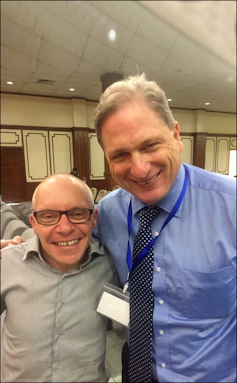How Sean Turnell came to be freed from a Myanmar jail
UTS Industry Professor Tim Harcourt explains how Australian economist Sean Turnell came to be in and freed from a Myanmar jail.

Macquarie University economist Sean Turnell is free and living in Sydney after 650 days of imprisonment in Myanmar, for what appears to be the “crime” of doing an economist’s job, which is trying to make people’s lives better – in this case the lives of the people of Myanmar.
A former Reserve Bank of Australia official, Turnell worked as an economic adviser to the government of Aung San Suu Kyi and continued to advise her after she was overthrown in a coup in February 2021.
He was imprisoned on trumped-up charges over the handling of confidential information – even though the papers he had in his possession were the papers he needed for his role as an economic adviser.
As a family friend and fellow economist, I was part of the campaign to get him released. Here are some personal reflections on Sean and that campaign.
Who is Sean Turnell?
Even before he set foot in Myanmar, Turnell’s story was a remarkable one.
He grew up in a working class family in the south western Sydney suburb of Macquarie Fields in the federal electorate of Werriwa, then represented by Labor’s Gough Whitlam. Sean’s dad, Peter Turnell, scored an invite to Whitlam’s house 50 years ago this week to celebrate Whitlam’s election as prime minister.
Whitlam ensured that Werriwa was sewered (it hadn’t been) and, by making university free, gave Sean the opportunity to go to Macquarie University.
As an academic at Macquarie University, Sean’s interest in Myanmar stemmed from his interest in social justice in general, from his own upbringing, and also getting to know Burmese students as an undergraduate at Macquarie.
Myanmar’s economy, after years of military rule (with the population of Canberra in the army despite no external threat) was underperforming. But Sean thought it had the potential of a Thailand or Vietnam with the right economic policies.
Sean established “Burma Watch”, a much-followed publication of economic data and analysis on the Myanmar economy, and then wrote an influential book on Myanmar’s financial system, Fiery Dragons that made him an internationally-recognised expert on the subject.
His reputation gained the interest and confidence of Aung San Suu Kyi and her National League for Democracy. Sean became a trusted adviser of “The Lady” when she was under house arrest and during the short time democracy was restored. He remains loyal to her to this day.
A global network of support
Macquarie University was also where Sean met the love of his life, his wife Ha Vu (also a development economist), who with other Macquarie University staff campaigned tirelessly for his release.
Sean Turnell with Tim Harcourt.
I have spoken to Sean several times since his release, and he has just started to realise how big the campaign to free him was.
He would like to thank the supporters in Australia and internationally who worked tirelessly for his release, among them Macquarie University economists David Throsby and Wylie Bradford, Peter McCawley at the Australian National University and Leanne Ussher of Bard College in New York, and American microfinance economist Curtis Slover, who delivered him food while in prison.
He had help from unexpected quarters. Bruce Wolpe, a former US Congressional aide, offered to enlist former New Mexico Governor Bill Richardson, who had successfully negotiated for the release of US journalist Danny Fenster.
In Australia, Sean’s campaign was assisted by two former ambassadors to Myanmar, Christopher Lamb and Nicholas Coppel. Both provided strategic advice and specific knowledge to the campaign and Lamb’s Australian Myanmar Institute provided resources and networks.
The union movement helped, as did the Economic Society of Australia, the hard-working officers of the Department of Foreign Affairs and Trade, and publications including The Conversation.
The energetic Labor MP for Lismore, Janelle Saffin, used her expertise and links. While having to deal with the Lismore floods at home, she found time to make waves in Myanmar.
The political campaign picked up after the election in May. Prime Minister Anthony Albanese and Foreign Minister Penny Wong became tireless in their advocacy, raising Sean’s case in international and regional meetings and pulling out all stops for Sean’s release.
Reflection, then a book
What next for Sean and Ha? It is unlikely Sean can ever return to Myanmar, although he says “he will always love the people of Myanmar”.
It might pay for Sean to be an armchair economist, at least for a while. He will be putting his literary skills to good use, writing a book about his ordeal and telling the story from inside and outside the prison’s walls.
And there is time for fun for Ha and Sean too. He is likely to want to see the musical Hamilton as, even before it began, he was fascinated with the life of the first Treasury Secretary of the United States, even visiting his archives in Washington DC in his holidays.
The people of Myanmar and Australia’s Burmese community are extraordinarily grateful. Thi Thi Power, a friend of Sean’s, said in tears when hearing of his release: “The Burmese people owe Sean one thousand times over”.![]()
Tim Harcourt, Industry Professor and Chief Economist, University of Technology Sydney
This article is republished from The Conversation under a Creative Commons license. Read the original article.

